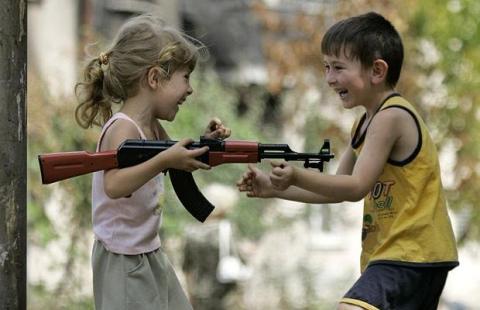They go on. They leave Omelas, they walk ahead into the darkness, and they do not come back. The place they go towards is a place even less imaginable to most of us than the city of happiness. I cannot describe it at all. It is possible that it does not exist. But they seem to know where they are going, the ones who walk away from Omelas. --Ursula Le Guin, "The Ones Who Walk Away from Omelas"
Nothing affects me more deeply than the death of a child. I was shocked and saddened by yesterday’s news that two-year old Carolyn Sparks was killed in Southern Kentucky when her brother accidentally shot her with the .22 caliber rifle that he got for his fifth birthday. My deepest sympathies go out to the Sparks family, whose lives have been forever transformed by this tragedy. I cannot even begin to understand their pain.
I also cannot understand the responses of the local officials who are investigating the incident. “The little Crickett rifle is a single-shot rifle, and it has a child safety," said the local coroner “it’s just a tragic situation." A state trooper added, "it's just one of those nightmares . . . a quick thing that happens when you turn your back. . . .in this part of the country, it's not uncommon for a 5-year-old to have a gun or for a parent to pass one down to their kid.”
I have no doubt that this later statement is true, but I am far from thinking that this is a good thing. And I can’t help but think that we might be prematurely resigning ourselves to the inevitability of this kind of tragedy because we don’t want to look too hard in the mirror and ask what it really means that we live in a society where giving deadly weapons to toddlers is “not uncommon.”
This is a version of the question that Ursula Le Guin asks in her classic story “The Ones Who Walk Away from Omelas.” In this story (which is based upon a thought experiment that Ivan proposes to Alyosha in the fifth book of The Brother’s Karamazov), Le Guin asks us to imagine a perfect society—a social and economic utopia in which everybody is happy and content except for one small child who must be imprisoned and tortured in order for the utopia to exist. And before entering adolescence, every citizen of Omelas must be told about this wretched child. Everybody in Omelas is disturbed by the news that their society is built on the suffering of a child, but most people eventually accept it, reasoning that this one person’s pain must be weighed against all of the good that the society produces.
Some few, however, chose to walk away. Le Guin does not tell us where they go, these ones who walk away from Omelas. That is not her mission. She simply affirms that it is possible to walk away from--or to simply refuse to keep accepting--a society, that requires us to assent to the suffering of children. I am not saying that we need more gun control.
Passing a law would be a simplistic (and ineffective) solution to a problem that springs from a deeper place than laws can go. What I am saying is this: in a society where it is considered normal to give a five-year-old child a deadly weapon, there are going to be fatal accidents involving guns and children. And in a rhetorical environment that treats any disapproval of guns as a threat to liberty, we will never be able to do anything about it. We must simply accept these accidents as a regrettable-but-necessary part of the culture that we have created. Unless we chose to walk away from Omelas.
